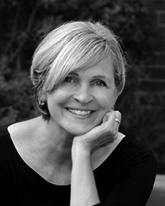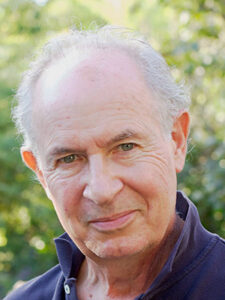Learning of Conspiracy Theories that “the Portal to Hell Resides Beneath the Denver Airport” (Emerging Writer’s Contest Winner: POETRY)
In poetry, our winner is Logan Klutse, for his poems “Bronx Operating Room” and “Learning of Conspiracy Theories that ‘the Portal to Hell Resides Beneath the Denver Airport.’”
Of the poems, poetry judge Sandra Cisneros says, “This poet’s work is unpretentious, intelligent, and intriguing. It mines the personal while confronting contemporary issues. Most refreshing is the poet’s use of language that makes the poems available and accessible to every reader.”
When did you first realize you wanted to be a writer? Or, when did you first call yourself a writer?
Growing up, I was fascinated with singing (albeit poorly). After a while, I realized that wasn’t in the cards for me in this life and let that dream go. But when I stumbled upon poetry, it felt like the closest I could get to music, and to music-making and song. From there, I recognized fragments of poetry within other genres and wanted to cultivate the music in them, too. A lot of my desire to write comes from the thrill of shaping sounds. But I didn’t seriously consider myself a writer until I joined WORD, a performance poetry group at my college, during my first year of undergrad.
Describe your writing process. What works for you as a writer? What do you find challenging, or even difficult, about writing?
I often go through long periods of only reading and researching, in which I do no writing at all and just intake as much art and information as I can. Which makes me feel like I’m doing something propulsive for my writing life, even when I’m not actually writing—and that helps prevent burnout, too, to have seasons of generation and seasons of contemplation. I like to write with sound and rhythm as primary mechanisms and to see what meanings they lead me to if I try prioritizing them over logic. And I tend to stew on an idea for a long time before writing the entire first draft in one go. Revision is an eternal struggle for me, though—reimagining what’s already there feels much more daunting than generating from blankness. But regardless of what strategies I use, I think I’ll always be fighting for my life in front of a Google doc—making my patience match my stamina feels like a continuous challenge of writing.
What inspired “Bronx Operating Room” and “Learning of Conspiracy Theories that ‘the Portal to Hell Resides Beneath the Denver Airport’”?
Grief, and what replaces grief. Which is often more grief, but also a series of questions: Who is responsible for this loss? Will attending to our grief become the project of our lives? What to do with the new hollow in me? How to honor and enshrine those who once filled that hollow? How can I eke out gentleness from this? Why are certain people asking me to write about that grief more palatably? Why is the poet being asked to approve of certain people’s reactions? Does not approving then make the poet a problem? And in navigating grief and its presentations, can I turn to the poem as a place to go? Does (my) poetry have the capacity to be that place? After losing several family members in the past few years, I needed to experiment with what a poem could and couldn’t contain, where I could make the language turn toward tenderness and where not. For “Bronx” I also thought about when, last year, another writer told me, “I want you to stop writing about ‘big issues’” in response to poems I’d written about family. Writing “Bronx Operating Room” after hearing that was my way of saying, “No. No, I don’t think I will.”
What’s the most valuable piece of writing advice you received?
At an AWP panel, I heard Jericho Brown say something to the effect of, “You have to be able to take on the level of bravery that the texts and authors you’re reading do.” I don’t think I’m anywhere as courageous as the writers I admire, but it’s a trait I aspire toward: cultivating a rigorous practice of interior emotional honesty, maintaining the emotional precision needed to parse through a memory or a scene with conviction. Because while you do have to identify what it is you enjoy when you’re reading (or, as I heard Brown warmly put it that day, “Get more in love!”), if what you’re reading features things that scare you, that’s also a sign of what’s calling you to write. So I suppose it’s this idea of writing both your obsessions and your aversions, and adopting the same steadfastness you admire in others in your own work. I remember one of my playwriting professors, Deb Margolin, once saying that courage was “the alignment of one’s actions with one’s deepest beliefs.” And what necessitates that courage is so expansive—getting more in love requires bravery too. Tenderness can require as much bravery to render as pain. Even those don’t have to be a dichotomy: plenty of what I love scares me.
What projects are you working on now? Where is your writing headed?
Right now, I’m working on my second play, as well as my first poetry collection—which I’m imagining will include poems about medicine, autopsies, medical malpractice, West African immigrant patients navigating hospitals, Ewe folklore, and forming a creative genealogy of Black diasporic faith practices and traditions. I think “Bronx Operating Room” will probably have a place in that collection, as will a series of poems in conversation with the Hippocratic Oath that I’ve been chipping away at. For now, I’m just letting each poem generate the next.
*
This air, these clouds, this length of sky
from sky to earth, the planes cleaving
a line through their stillness and the light
sieving through the roof’s glass to land
on the travelers beneath it—its real secrets are still young.
When the Denver airport was first built,
my uncle and the other workers wrote notes and stories
on scraps of paper, slipped them inside the space between walls,
and sealed them away with fiberglass and wood,
made a time capsule for curious eyes of the future.
A reminder that always, we are more than our imagined horrors,
of what a gift it is to be able to anticipate your fears before they become real.
Decades later, at another construction site, the wind circling his ankles,
my uncle falls two stories from insecure scaffolding—
one loose bolt, one buckle, one touch a few seconds short of becoming
a handhold, and then, change.
Do you know what the ground does to a body
it wasn’t expecting to cradle? How the body is made
to absorb the aftershock of someone else’s mistake?
What kind of rubble you leave behind when you are killed by what you built?
Now, as if at the cracking of a keystone, I fear my family
will always be sifting through the aftermath of our unmaking,
clearing the eulogy from our throats, thinking of who we will outlive
next, because there is always someone left
to lose.
I look to my kin, and think: always remember
I was you before I was myself.
Know, that before we became
the consequences of our loving,
we were each other.
Before I was a hysteric angel
caught at the fever pitch of grief,
winged beggar pleading with the sky for mercy,
for a miracle, to weave itself into a net, to be something other
than empty space between a life
and a bitter earth, I was someone more
whole than this.
If one day, I outlive this world and its god,
rove through the ruins of the places he once built,
find his note between the fallen walls,
and give the words breath, again, would it sound like this?
If everything that I touched, changed?
If the mountains hemmed in the horizon,
if I gathered the earth into my palms,
if I became something else out of
my own unraveling, found retreat
from the fever pitch of grief,
rearranged the rubble into the shape of a monument:
would that be a better place to go
looking for something holy?
Live
with the lingering image
of a loved one tumbling to a graceless end,
and you too may be convinced
that there are no kinder ways of meeting God,
just this one.


